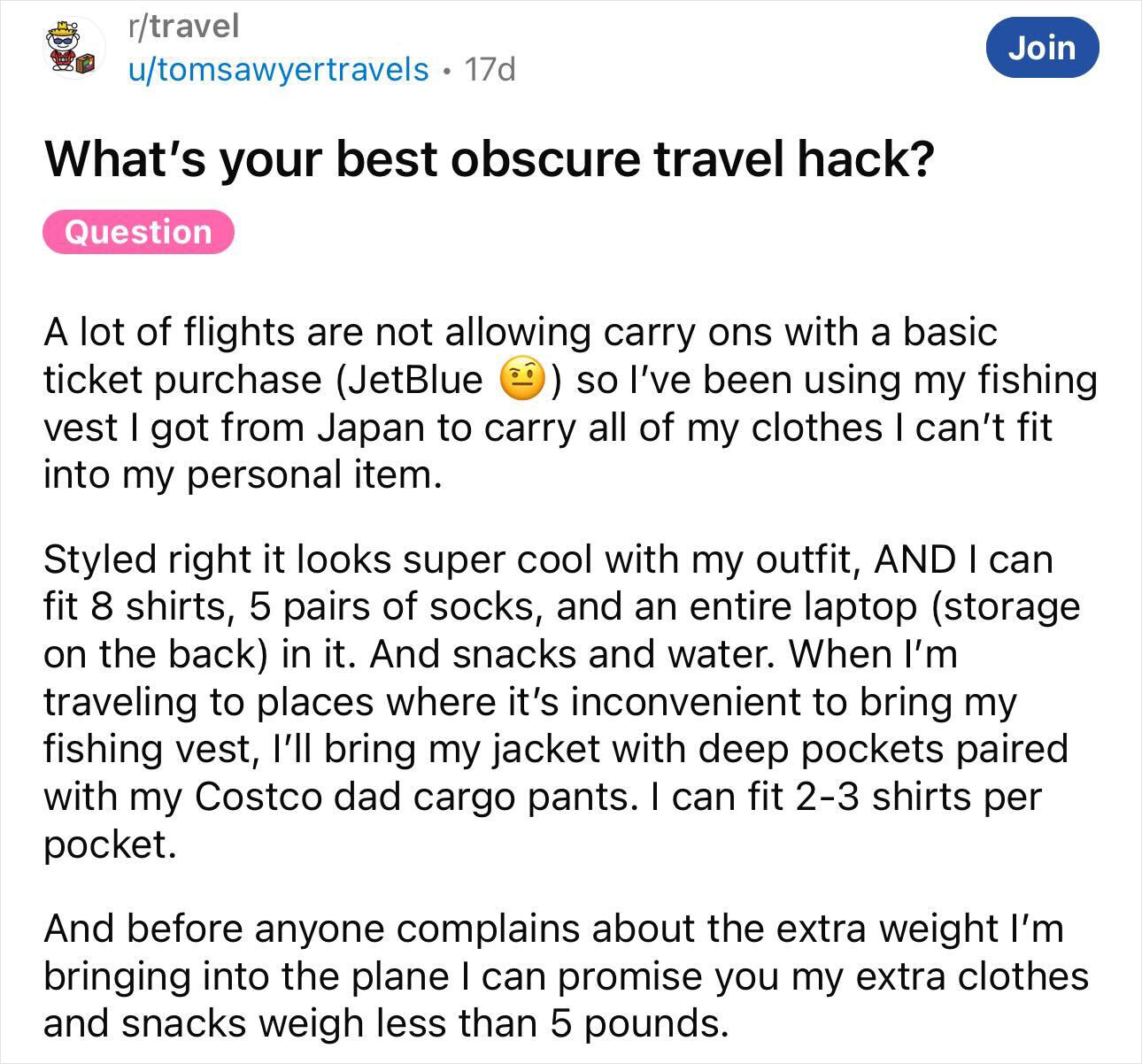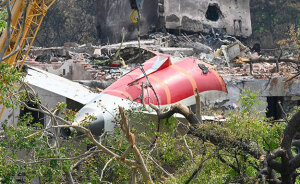It never hurts to get some travel advice, but the internet is absolutely littered with tips so common sense as to not be useful at all. So it can be quite useful to get in touch with people who have actually seen and done enough for proper ideas.
Someone asked “What’s your best obscure travel hack?” and people shared their tips and tricks. We also got in touch with seasoned traveler Victoria from Bridges and Balloons and she was kind enough to share some of her experiences with us. So get comfortable as you scroll through, upvote your favorites and be sure to share your thoughts in the comments section below.
More info: Bridgesandballoons.com | Instagram
This post may include affiliate links.
 If you're not sure of the neighborhood you're booking your hotel or rental stay in, go to Google Street View and "walk around" in the neighborhood. You can see if it looks pleasant, has nearby cafes or local grocery stores, etc etc.
If you're not sure of the neighborhood you're booking your hotel or rental stay in, go to Google Street View and "walk around" in the neighborhood. You can see if it looks pleasant, has nearby cafes or local grocery stores, etc etc.
This is a REALLY good tip. I’ve been in the travel industry for 43 years and this truly is a great idea. Trip Advisor can be misleading since it’s difficult to separate out the fake or incentivized posts so “visiting the neighborhood prior to booking” is a great way of bringing the property to light.
 One of my favorite obscure travel hacks is to use Google Maps offline. Before my trip, I download the maps of the areas I’ll be visiting. This way, I can navigate, find attractions, and even search for restaurants without needing an internet connection. It’s especially useful in places with spotty Wi-Fi or when I want to save on data usage. Plus, it saves a ton of stress and helps me feel more confident exploring new places.
One of my favorite obscure travel hacks is to use Google Maps offline. Before my trip, I download the maps of the areas I’ll be visiting. This way, I can navigate, find attractions, and even search for restaurants without needing an internet connection. It’s especially useful in places with spotty Wi-Fi or when I want to save on data usage. Plus, it saves a ton of stress and helps me feel more confident exploring new places.
I always keep a safety pin pinned inside my backpack; this was originally for changing SIM cards, but it turns out to be quite handy while traveling. I also take one of my pens and wrap/roll a bunch of masking tape around it, so I always have a little supply of tape; again, constantly useful, mostly for covering up bright LED lights inside the hotel room.
Bored Panda got in touch with seasoned traveler Victoria from Bridges and Balloons to hear more about her experiences and ideas. Firstly, we wanted to hear what advice she would give her younger self.
“When I was younger, I seemed to think time was endless and I’d definitely return to the places I loved. As it is, I still haven’t made it back to some of them. The lesson from this is to make sure you see the things you want to see wherever you go and savor every moment. You don’t know if you’ll ever be back there. That said, I don’t believe in “ticking off all the must-sees” and doing things because that’s what you think you should. Everyone’s “must-sees” are different, so do what you like rather than what you think you should.”
 Always carry a sarong with you when travelling. It’s basically an all in one lightweight tool. You can use it as clothes, raincoat, a rope, a bandage, a beach towel/picnic rug, a bag or a blanket.
Always carry a sarong with you when travelling. It’s basically an all in one lightweight tool. You can use it as clothes, raincoat, a rope, a bandage, a beach towel/picnic rug, a bag or a blanket.
 If flying between the US and Canada, ALWAYS look at buying separate one-way tickets each direction. More often than not, you'll save $100+ due to their strange exchange rate and tax calculations. It doesn't work on every single route, but is always worth a check, and I've been amazed how often it's been much cheaper.
If flying between the US and Canada, ALWAYS look at buying separate one-way tickets each direction. More often than not, you'll save $100+ due to their strange exchange rate and tax calculations. It doesn't work on every single route, but is always worth a check, and I've been amazed how often it's been much cheaper.
My wife and I took a train trip while vacationing in Canada. She was just over the senior citizen mark, and I was just under. My fare was completely free because I was "escorting a senior citizen". I try not to remind my wife of this more than weekly.
 If you have to cancel a hotel less than 24 hours in advance, call and tell them you need to bump the reservation back a week. Then call the next day and cancel it penalty free because it’s 6 days prior to the reservation.
If you have to cancel a hotel less than 24 hours in advance, call and tell them you need to bump the reservation back a week. Then call the next day and cancel it penalty free because it’s 6 days prior to the reservation.
Doesn't work in Australia. If you move the booking in less than 24 hours, the staff will add a note to your booking - cancellation refund not allowed. I worked for hotel reservations 18 years ago, and already then, it was a common practice to deter people from looking for loopholes.
We were curious to hear her thoughts on saving money versus paying a premium for convenience. “I definitely value time over money and will often pay extra for convenience or comfort. But that’s a luxury and a privilege. When I was younger, I didn’t always have that option, and to be honest some of those adventures were the most memorable. For example, I once traveled 48 hours on a bus to go whale watching in Patagonia. If I’d had the money, I’d have certainly flown, but the effort made it extra special. When you have a choice, it’s hard to pick the days-long bus trip!”
 If you’re flying internationally into the US and are a US citizen, do the mobile passport option if the airport has it. It’s an app and takes 30 seconds to do. It’s just as fast as global entry. I’ve passed 100s of people waiting at passport control.
If you’re flying internationally into the US and are a US citizen, do the mobile passport option if the airport has it. It’s an app and takes 30 seconds to do. It’s just as fast as global entry. I’ve passed 100s of people waiting at passport control.
 There's a London night bus which goes to Heathrow and back. I say this one in particular because it's quite a long route. If you arrive late in the evening and need somewhere to just exist, you can ride it back and forth and sightsee or snooze a little. I discovered this when I arrived via bus from France in the middle of the night but my next bus up to Edinburgh didn't leave for like 6 hours. Seemed pointless to get a hotel room.
https://tfl.gov.uk/bus/route/n9/
Changi airport in Singapore has something similar, but it's an actual tour bus you can take for free during a layover.
https://www.changiairport.com/en/airport-guide/facilities-and-services/free-singapore-tour.html.
There's a London night bus which goes to Heathrow and back. I say this one in particular because it's quite a long route. If you arrive late in the evening and need somewhere to just exist, you can ride it back and forth and sightsee or snooze a little. I discovered this when I arrived via bus from France in the middle of the night but my next bus up to Edinburgh didn't leave for like 6 hours. Seemed pointless to get a hotel room.
https://tfl.gov.uk/bus/route/n9/
Changi airport in Singapore has something similar, but it's an actual tour bus you can take for free during a layover.
https://www.changiairport.com/en/airport-guide/facilities-and-services/free-singapore-tour.html.
We’re heading to Singapore soon so was happy to hear this but it does come with conditions. This link works better than above. https://www.changiairport.com/en/discover/tours-and-learning.html
“I’ve always been a complete geek when it comes to planning. I love to do my research and make a rough list/itinerary of everything I want to do. But I’m not a slave to that plan. In a way it’s a back-up in case we don’t find things naturally while there. I much prefer to find things spontaneously, but sometimes, without that research and list of back-ups, you find yourself in tourist traps or crappy restaurants (and that’s my travel nightmare!).”
Always pack a power board when I go overseas, only need one converting plug and you are good to go with all devices. Especially helps with my CPAP and being able to charge devices.
I had a power strip with me on my last trip. Long layover in Norfolk, I was charging my phone and 5 other people's.
I always pack a mini LED flashlight. They're a few bucks on Amazon and eBay. It was quite useful recently when I visited a Belizean island with no street lights. Got jump scared by a few land crabs, too.
Less dangerous than Land Sharks but Land Crabs should still be respected
In my luggage I always pack an empty 30 gallon trash bag, for my dirty clothes. I tend to sweat a lot in hotter climates, and having my dirty clothes in a trash bag (which is often lined with an odor eliminator) and separate from my clean clothes keeps my suitcase from becoming smelly. And it makes unpacking at the end of the trip dirt-simple: the trash bag full of clothes goes into the laundry. My wife and I always pack large binder clips (such as for holding large documents together) to close window shades, and we always pack a titanium hiking spork or plastic utensils for leftovers. And always have a pen with you. It’s surprising the number of places, especially when traveling internationally, when having a pen with you is useful. Finally, if you’re out shopping for clothes, shop in hiking sections of stores like REI for *light-weight* clothing; that is, clothing intended for packing during hiking. I managed to bring the weight of my check-on luggage from 45 pounds to around 28 pounds by mindfully thinking about the weight of the articles of clothing I was packing; hiking pants instead of jeans, for example. Three pair of jeans weighing 2 pounds each verses 3 pairs of hiking pants weighing around 8 ounces each makes a difference, and 8 shirts made with lightweight materials intended for hiking is a lot lighter than 8 ‘cheap’ t-shirts.
a grocery store plastic bags (depending on your country) is also good for dirty clothes and takes up very little space.
“I used to use guidebooks, but nowadays I turn to travel blogs. I always recommend finding a blogger you relate to and using their guides - it’s like having a really knowledgeable friend with great recommendations. But remember not all blogs are created equal - many are vacuous SEO machines. You just need to find one you can trust,” she shared.
 We once racked up over 20,000 capital one points in an unconventional way.
We were in Paris and we'd rent the Velib bikes to get around the city. The catch is that everytime we'd rent a bike out, a hold was put on our credit card in case of damage to the bike. The hold was close to $400 each bike, I believe, and It would take a couple days for the hold to be lifted.
For some reason the hold would go through as a purchase on our card, and with the travel multiplier, we were getting about 1,600 points every time we'd rent a bike.
The best part was that, if you rented the bike for less than 30 minutes the rental was free. So we'd just rent 2 bikes, ride to the next station in less than 30 minutes, drop them off and rent 2 more bikes. We did this an absurd amount of times and got rewarded handsomely. .
We once racked up over 20,000 capital one points in an unconventional way.
We were in Paris and we'd rent the Velib bikes to get around the city. The catch is that everytime we'd rent a bike out, a hold was put on our credit card in case of damage to the bike. The hold was close to $400 each bike, I believe, and It would take a couple days for the hold to be lifted.
For some reason the hold would go through as a purchase on our card, and with the travel multiplier, we were getting about 1,600 points every time we'd rent a bike.
The best part was that, if you rented the bike for less than 30 minutes the rental was free. So we'd just rent 2 bikes, ride to the next station in less than 30 minutes, drop them off and rent 2 more bikes. We did this an absurd amount of times and got rewarded handsomely. .
I fly long haul flights that are 14+, and so compression socks are a must. If I take my shoes off to put on my sling, I’ll also bring fuzzy socks so my feet don’t get cold. Have a small baggie of hydrating powder for water, Advil, ear plugs, Imodium. I have a headband that hooks onto my mask so I don’t have to have my mask behind my ears, which can sometimes make them sore.
Merino wool clothes keep you smelling fresh so you can pack less. Never thought I would be wearing a wool Tshirt, but it works! Pricey though.
“For me, travel has always been about perspective. I love to get outside of my bubble and see other cultures and ways of life. It’s a type of therapy for me, and one I think everyone could benefit from. It’s the antidote to getting stuck in your ways. And while I am willing to pay more for convenience and luxury, I don’t think expensive always equals better. We always seek out places that have character and creativity, and that could just as easily be a budget guest house as a luxury retreat. For us, it’s the experience that matters most.”
 When going through security, put all of your pocket belongings into your backpack.
Then, you don’t have to worry about using the small trays, or gathering up important things from the conveyor belt :).
When going through security, put all of your pocket belongings into your backpack.
Then, you don’t have to worry about using the small trays, or gathering up important things from the conveyor belt :).
 Most flights won't give you a refund on basic tickets. Upgrade them to a higher class ticket then cancel for a full refund.
EDIT: I've done this with United/JetBlue I can't speak for other airlines.
Most flights won't give you a refund on basic tickets. Upgrade them to a higher class ticket then cancel for a full refund.
EDIT: I've done this with United/JetBlue I can't speak for other airlines.
Don't wear tight shoes on a plane. Due to the pressure change your feet swell on the flight.
Sneakers with light, flexible upper fabric and flexible soles.
 Might not be obscure to some, but was new to me last month.
Esims are a godsend.
You can shop around online before starting your trip for the best deal on a temporary esim. I paid 30 cad for a 1 month 12 gig unlimited everything else plan, good for all of Europe. Installed the esim before heading to the airport. As soon as the plane landed, I was able to fire up my esim without any of the hassle of finding a physical sim card. Was in my Uber 10 minutes after leaving customs, it was great.
Not all phones support it, but for those that do, they are extremely convenient and cheap.
Might not be obscure to some, but was new to me last month.
Esims are a godsend.
You can shop around online before starting your trip for the best deal on a temporary esim. I paid 30 cad for a 1 month 12 gig unlimited everything else plan, good for all of Europe. Installed the esim before heading to the airport. As soon as the plane landed, I was able to fire up my esim without any of the hassle of finding a physical sim card. Was in my Uber 10 minutes after leaving customs, it was great.
Not all phones support it, but for those that do, they are extremely convenient and cheap.
 Traveling International? Bring a pen with you. The longest lines you wait for at customs is for the damn pen.
Pack a plastic fork and spoon with you. I hate showing up to my hotel with some instant noodles and then having to use the coffee stirring sticks like chopsticks to eat it.
If you’re tall, mention you have problems with your knees at the check in counter. Sometimes they’ll find you a seat with more leg room.
Traveling for a short period? Use a garment bag instead of a suitcase. I find I can fit 3 outfits, my laptop and other essentials in one garment bag comfortably and it still fit as a carry on. .
Traveling International? Bring a pen with you. The longest lines you wait for at customs is for the damn pen.
Pack a plastic fork and spoon with you. I hate showing up to my hotel with some instant noodles and then having to use the coffee stirring sticks like chopsticks to eat it.
If you’re tall, mention you have problems with your knees at the check in counter. Sometimes they’ll find you a seat with more leg room.
Traveling for a short period? Use a garment bag instead of a suitcase. I find I can fit 3 outfits, my laptop and other essentials in one garment bag comfortably and it still fit as a carry on. .
If you’re tall or have bung knees, pay extra for a seat with more leg space guaranteed instead of expecting it for free.
Random one but saline spray in the carry on! I feel that spritzing my nose a few times every flight helps prevent me from getting sick (I used to ALWAYS get sick on flights)!
 I always create a Google map list and save items to populate my map. It makes it easy to plan out your days and see what sites/restaurants/attractions you are near in a new city.
I always create a Google map list and save items to populate my map. It makes it easy to plan out your days and see what sites/restaurants/attractions you are near in a new city.
I have so many saved lists on Google Maps, every time I see a place I'd love to visit, I add it. Then, when I'm traveling to that area I already have some spots that I know I want to see.
Fannypack when going through airports for my passport, phone charger + foreign wall adaptor, two power banks for unpredictable situations, the little pocket is for coins for the bathrooms, and for security I'll also stuff my wallet in there to minimize the amount of stuff I have out.
 I always bring baby shampoo and an entire unopened box of ziploc bags.
The baby shampoo is great for washing yourself (obviously) but is also perfect for washing things like lightweight shirts, underwear, and socks in the sink. I’ve also put on my flight suit inside out and washed it in the shower. If you don’t get all of the baby shampoo rinsed out, your skin won’t be irritated like it would be if you had used regular soap.
I always bring baby shampoo and an entire unopened box of ziploc bags.
The baby shampoo is great for washing yourself (obviously) but is also perfect for washing things like lightweight shirts, underwear, and socks in the sink. I’ve also put on my flight suit inside out and washed it in the shower. If you don’t get all of the baby shampoo rinsed out, your skin won’t be irritated like it would be if you had used regular soap.
Sea to Summit and other brands make little detergent sheets which work fantastic when you're washing clothes in the sink. I always bring a pack of those along with enough of the larger sheets made for washing machines. Baby shampoo isn't less irritating to your skin, it just has a ph level hat doesn't irritate the eyes.
 I always try to have an extended layover (like 10 hours or more) so I can visit the layover city. This way I've been able to visit Tokyo, Abu Dhabi, Singapore without going on a specific trip to those destinations. It takes a bit of fiddling around to book those flights (airlines present you with the 'most convenient' flight) but it's worth it.
I always try to have an extended layover (like 10 hours or more) so I can visit the layover city. This way I've been able to visit Tokyo, Abu Dhabi, Singapore without going on a specific trip to those destinations. It takes a bit of fiddling around to book those flights (airlines present you with the 'most convenient' flight) but it's worth it.
Before booking for this, double check which places require a tourist visa for layovers, how long it takes getting to and from the airport with traffic when youre there, how long security and customs takes, and if its a day and time when a lot of things will be closed. Especially nowadays when airports are so inefficient, you may not have the time you think you do.
Probably obvious, but put airtags in your checked luggage.
Hm... Does anybody know if there is an alternative to airtags? Something that doesn´t involve apple?
I travel with wrinkle resist clothing only. Still gets wrinkled. So I carry a small sprayer bottle. Spritz down clothes night before with water and hang to dry, wrinkles gone in the AM. Haven't ironed in years.
We book one way flights sometimes on different airlines and have saved compared to booking a round trip.
 Southwest starts drink service at rows 1,8,15,22. If you have a choice of row 9 or 15, go to 15. You get your drink first and have a better chance at getting more than one.
Southwest starts drink service at rows 1,8,15,22. If you have a choice of row 9 or 15, go to 15. You get your drink first and have a better chance at getting more than one.
 This is probably outdated these days, but I used to exchange cash with travelers going the opposite direction when I landed. .
This is probably outdated these days, but I used to exchange cash with travelers going the opposite direction when I landed. .
This is niche to Sydney International airport, but never get a customs ticket at the first station. Keep walking there are empty ones right before you go through customs / e passport check.
The (almost) cure for jetlat is staying up to a decent bed time and then taking a melatonin. Keep a pair of chord headphones in your travel bag at all times for the inflight entertainment. Always bring a swimsuit just incase LAX terminals sometimes have alternative security areas. These are also manned and sometimes empty.
Everybody probably already knows this, but when you get to your new location, spend as much time outside in the sunshine as you can. It helps your body adjust to the new time zone. Also, lightboxes made for seasonal affective disorder are small and lightweight these days, so you could bring one of those along to help you wake up in the morning in the new place.
 A lot of flights are not allowing carry-ons these days with a basic ticket purchase (JetBlue 🤨), so I've been using my fishing vest I got from Japan to carry all of my clothes I can't fit into my personal items. Styled right, it looks super cool with my outfit, AND I can fit eight shirts, five pairs of socks, and an entire laptop (storage on the back) in it—and snacks and water. When traveling to places where it's inconvenient to bring my fishing vest, I'll bring my jacket with deep pockets and my Costco dad cargo pants. I can fit 2-3 shirts per pocket. And before anyone complains about the extra weight I'm bringing into the plane, I can promise you my extra clothes and snacks weigh less than 5 pounds.
A lot of flights are not allowing carry-ons these days with a basic ticket purchase (JetBlue 🤨), so I've been using my fishing vest I got from Japan to carry all of my clothes I can't fit into my personal items. Styled right, it looks super cool with my outfit, AND I can fit eight shirts, five pairs of socks, and an entire laptop (storage on the back) in it—and snacks and water. When traveling to places where it's inconvenient to bring my fishing vest, I'll bring my jacket with deep pockets and my Costco dad cargo pants. I can fit 2-3 shirts per pocket. And before anyone complains about the extra weight I'm bringing into the plane, I can promise you my extra clothes and snacks weigh less than 5 pounds.
I'm imagining this bulgy guy pulling half a ham sandwich and soda out of his left pocket, then reaching behind him like some samurai and whipping out his laptop before sitting down in his seat.
It's easy to find good/safe areas to stay in using Google Maps. Just search for Starbucks and you'll notice there are certain areas with clusters of Starbucks. 90% chance these are safe areas. But if you want to be 100% sure, take note of those areas and search for "yoga". If you see a bunch of yoga studios overlapping, you're golden. This takes about 10 seconds to do. ** This method may not be effective is some places, for various reasons. I can only say this method served me very well while traveling in Mexico for 9 months. *** For the "live like a local" types who dislike gentrification and relish the thought of getting mugged day one this method also works because it'll let them know exactly where *not* to stay. Happy travels!
Mini spray bottle with alcohol (vodka or isopropyl) for deodorizing clothes. Edit: diluted hand sanitizer works too.
For work: always carry a Sharpie. I write the expense category/type and date at the top of each one. When I upload them in I can read them easily and I don’t have to worry about which country or language it was. Bandana- use as a hand towel, neck cover, head cover, etc Snow Peak sporks- lightweight with excellent forking action ;) Google Keep Master Packing List- unique sections for electronics, dry toiletries, liquid toiletries, electronics, work, creative, seasonal needs, etc. copy a new one for each trip and click/check things off as I pack. I keep a short list of morning-of to-do’s at the top as needed (fill cat feeders, pack toothbrush, etc).
Great. Take a picture of the receipt also in case you lose the receipt or you accidentally wet it. Some receipts fade badly.
 Use the hangers in the hotel room to clip the curtains together to blackout the room.
Use the hangers in the hotel room to clip the curtains together to blackout the room.
 Requesting a special meal (i.e. vegetarian) on an international flight will ensure you get served first.
I love ice in my water bottle so I always get a grande ice water at the airport Starbucks once past security to fill it up with.
Requesting a special meal (i.e. vegetarian) on an international flight will ensure you get served first.
I love ice in my water bottle so I always get a grande ice water at the airport Starbucks once past security to fill it up with.
Of course, that’s only if being served before everyone else is really that important to you.
If you travel to Hawaii, rent a jeep. They will give you a list of all the places you are not allowed to take the jeep. Now you have your itenerarry.
My travel tips would be: don’t bother with voltage adapters for things like electric shavers or hair dryers if you’re traveling to a place you can easily buy those little appliances locally. You’ll know they’ll work & it’s generally cheaper than the adapter. Or, to use a specific example (Paris), don’t pack anything you can pick up at Monoprix. For extended budget hotel stays, I’ll pick up flatware/dishware at a charity shop to use during my stay. Cheaper than disposable, less wasteful, then I just re-donate them on the way out.
If you are traveling to do fun wilderness hiking or visiting the local natural area, sure! check those travel blogs and vlogs for the fun secret places! But also dont have a set idea of what you will do there. Talk to the locals, maybe at the gas station in the area. They will let you know if jumping into that water is dangerous, and why, or what sections of the river to avoid. I live near some popular rivers and lakes, and there is one lake that has a high risk of thermal shock when you jump into its frigid waters, and the sides of the lake are very steep, so if you break your leg or start having issues due to the temp, its very hard for rescue teams to get to you. Same with some sections of the river. There are some rapids that claim a life each year. Also check to see if there are rentable safety gear! You might not want to pack or buy a life vest, but not having one is the leading cause of death on the river. Many places around here let you rent or borrow one for the day
Don't rely on your phone or other device when travelling abroad. Have your itinerary in full, including flight numbers, gates, connections, train and station information, important addresses and phone numbers, packing list (for re-packing), airport information, and all other essentials as a hard copy, and keep that on your body at all times, along with your ticket and passport.
My travel tips would be: don’t bother with voltage adapters for things like electric shavers or hair dryers if you’re traveling to a place you can easily buy those little appliances locally. You’ll know they’ll work & it’s generally cheaper than the adapter. Or, to use a specific example (Paris), don’t pack anything you can pick up at Monoprix. For extended budget hotel stays, I’ll pick up flatware/dishware at a charity shop to use during my stay. Cheaper than disposable, less wasteful, then I just re-donate them on the way out.
If you are traveling to do fun wilderness hiking or visiting the local natural area, sure! check those travel blogs and vlogs for the fun secret places! But also dont have a set idea of what you will do there. Talk to the locals, maybe at the gas station in the area. They will let you know if jumping into that water is dangerous, and why, or what sections of the river to avoid. I live near some popular rivers and lakes, and there is one lake that has a high risk of thermal shock when you jump into its frigid waters, and the sides of the lake are very steep, so if you break your leg or start having issues due to the temp, its very hard for rescue teams to get to you. Same with some sections of the river. There are some rapids that claim a life each year. Also check to see if there are rentable safety gear! You might not want to pack or buy a life vest, but not having one is the leading cause of death on the river. Many places around here let you rent or borrow one for the day
Don't rely on your phone or other device when travelling abroad. Have your itinerary in full, including flight numbers, gates, connections, train and station information, important addresses and phone numbers, packing list (for re-packing), airport information, and all other essentials as a hard copy, and keep that on your body at all times, along with your ticket and passport.

 Dark Mode
Dark Mode 

 No fees, cancel anytime
No fees, cancel anytime 















































































